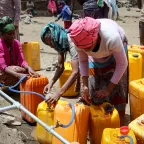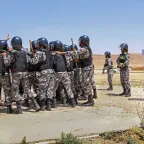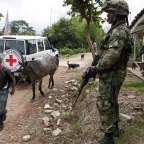The Geneva Conventions and their Commentaries
The 1949 Geneva Conventions and their Additional Protocols are international treaties that contain the most important rules limiting the barbarity of war. They protect people who do not take part in …
The 1949 Geneva Conventions and their Additional Protocols are international treaties that contain the most important rules limiting the barbarity of war. They protect people who do not take part in …
Everybody has a right to health care – even in war. We don’t take sides, and we will always uphold our principles of humanity, neutrality, impartiality and independence in the course of our work. We …

Every detainee deserves to be treated with dignity and fairness, regardless of the reason for their arrest and detention. Protecting and assisting people deprived of their liberty Ensuring respect …

When conflict impedes access to clean water, safe shelter or a sustainable living environment, the consequences are severe and far-reaching. Public health crises There is a direct correlation between …

Between 2012 and 2015, the ICRC undertook two major consultation processes on strengthening legal protection for victims of armed conflict. These two processes have since moved into a new phase, …
States often face situations in which their officials must use force to maintain or restore public security and law and order in armed conflicts or other situations of violence. Such use of force is …

Communication is crucial to promote and raise awareness of Restoring Family Links services which are provided by the Family Links Network. Under the joint lead of the Canadian Red Cross and the …
International humanitarian law (IHL), or jus in bello , is the law that governs the way in which warfare is conducted. Explaining jus ad bellum and jus in bello International humanitarian law (IHL), …

International humanitarian law governs the choice of the means and methods of warfare and prohibits or restricts the use of certain weapons. The ICRC plays a leading role in the promotion and …

Cluster munitions kill and injure large numbers of civilians and cause long-lasting socio-economic problems. The 2008 Convention on Cluster Munitions prohibits the use, production, stockpiling and …

Try one of the following resources:
Created in 1863, the ICRC library, alongside the ICRC archives, provides an indispensable documentary reference on the organization itself and international humanitarian law.
International humanitarian law is based on a number of treaties, in particular the Geneva Conventions of 1949 and their Additional Protocols, and a series of other instruments.
Customary international humanitarian law consists of rules that come from "a general practice accepted as law" and that exist independent of treaty law.